National Action Plan on the Sustainable Use of Plant Protection Products
The objective of the National Action Plan on the Sustainable Use of Plant Protection Products (NAP) is to further reduce the risks associated with the use of pesticides. The NAP is being further developed in line with the commitments made in the coalition agreement.
Further development of the NAP
The NAP Forum held a meeting in Bonn on 29 and 30 November 2022 at the invitation of the Federal Ministry of Food and Agriculture (BMEL). Roughly 90 representatives from authorities at federal and Länder level, associations and other organisations in the fields of agriculture, forestry, water management, environmental protection and nature conservation, the business community as well as private gardens and allotments participated in the meeting. State Secretary Silvia Bender presented the BMEL’s core principles for further developing the National Action Plan on Plant Protection (German only) to the participants.
Ms Bender announced that the BMEL would table an overall concept for reducing the use of plant protection products in 2023. This concept aims to address the objective of the European Farm to Fork Strategy to reduce the use of and risks associated with plant protection products by a total of 50 percent by 2030 as a national reduction target. The NAP is intended to form an integral component of the concept. To this end, the NAP will be refined with regard to its substance and structure. For further information on the NAP, click here.
The BMEL organised a video conference as early as 1 June 2022 to give representatives of interested parties concerned with the topic of plant protection the opportunity to present their positions regarding the further development of the plan. The plan is to expand the NAP to include the subject area of “reducing the use of plant protection products”. Moreover, the thematic cluster of “measures for integrated crop protection” is to be expanded.
NAP – the status quo
The Action Plan is based on the current legal regime regarding plant protection products in Germany. The legal framework is very comprehensive. It includes pesticide approvals that give users clear rules on product handling and application, stipulations on the quality and safety of crop protection equipment and on the expertise that product users must possess, and supplementary requirements set out in the German Plant Protection Act, the German Best Practice Code on Crop Protection and other areas of law.
The measures in place focus on promoting innovation in plant protection and the development of methods for integrated crop protection. This will be underpinned by appropriate measures implemented and funded by the Federal Government and the Länder. The Federal Government and the Länder provide resources within the scope of their remit. The measures include:
- Support for the development of procedures to limit the risks in plant protection (research in the field of integrated plant protection and plant protection in organic farming)
- Introduction of new technologies into farming practice
- Compliance with quantity limits when using pesticides
- Guidelines on integrated plant protection for specific crops and sectors
- Development of practical directions for use as part of the approval process for plant protection products
- Recommended usage or usage restrictions for certain pesticides
- Use of pesticides on non-agricultural land (including municipal areas and railway lines)
- Plant protection in private gardens and allotments (for instance improved availability of information on plant protection, especially about non-chemical plant protection measures; survey of plant protection in private gardens and allotments)
- Improvement of expertise and information (consolidating the expert knowledge for users, consultants and distributors; improvement of official plant protection advisory services)
- Improving safety for users and uninvolved third parties
- Compliance with plant protection provisions (control programme for plant protection; measures against illegal trafficking in plant protection products)
- Measures relating to food safety (reduction of violations of the maximum residue limits; multiple residues)
- Measures relating to water protection (improvement of the knowledge base and better protection of water bodies; prevention of plant protection products from entering the surface water)
- Preservation of biological diversity
A set of indicators and reference data serve to assess the target achievement of the National Action Plan. All chosen indicators are relevant to the aims of the National Action Plan and allow the level of target achievement, and thus the success of the Action Plan’s measures, to be evaluated.
Pilot project on "Demonstration farms for integrated plant protection"
An important measure within the scope of the NAP is the trial and practical implementation of new integrated plant protection methods. To this end, the BMEL initiated the pilot project on "Demonstration farms for integrated plant protection". Between 2011 and 2018, a network of farms was set up to reflect important farming systems and representative regions in Germany. A total of 67 establishments in the field of arable farming, apple growing, viticulture, field vegetable and hop production from ten Länder, namely Baden-Württemberg, Bavaria, Hesse, Mecklenburg-Western Pomerania, Lower Saxony, North Rhine-Westphalia, Rhineland Palatinate, Saxony-Anhalt, Schleswig-Holstein and Thuringia, demonstrated integrated plant protection the highest level and trialled the practical application of new methods. The pilot project was supervised by the Julius Kühn Institute (JKI) and the Federal Office for Agriculture and Food (BLE) in cooperation with the plant protection services of the participating Länder.


















